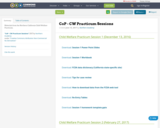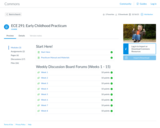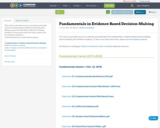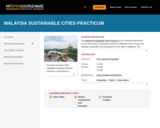
Materials from the Northern California Child Welfare Practicum.
- Subject:
- Career and Technical Education
- Social Science
- Material Type:
- Homework/Assignment
- Date Added:
- 12/09/2016

Materials from the Northern California Child Welfare Practicum.

This subject explores the techniques, processes, and personal and professional skills required to effectively manage growth and land use change. While primarily focused on the planning practice in the United States, the principles and techniques reviewed and presented may have international application. This course is not for bystanders; it is designed for those who wish to become actively involved or exposed to the planning discipline and profession as it is practiced today, and as it may need to be practiced in the future.

Directed field experiences with young children (birth to eight years) in varied early childhood education settings; applying child development theories and principles in support of developmentally effective approaches; planning and facilitating small and large group play-based learning experiences aligned with Arizona Early Learning Standards; refining observation and evaluation skills; adapting curriculum to children’s abilities and interests; practicing effective interactions and child guidance techniques; and evaluating the components of quality early childhood education programs. Required practicum experiences in at least two of the three early childhood groups (B-3, 3-5, or 5-8 years) and in at least two different approved early childhood settings.

This resource provides access to materials associated with the Fundamentals in Evidence-Based Decision-Making series at the Northern California Training Academy. To learn more about the series, please visit the Academy website at www.humanservices.ucdavis.edu/academy

The Malaysia Sustainable Cities Practicum is an intensive field-based course that brings 15 graduate students to Malaysia to learn about and analyze sustainable city development in five cities in Malaysia. The students in the Practicum will help determine the extent to which these efforts have been successful. They will identify specific projects or policy-making efforts that the following year’s cohort of International Visiting Scholars can examine more closely.
Lead Faculty
Professor Larry Susskind
Teaching Assistants
Jessica Gordon
Yasmin Zaerpoor
Administrative Staff
Takeo Kuwabara
Selmah Goldberg

The Malaysia Sustainable Cities Practicum is an intensive field-based course that brings 15 graduate students to Malaysia to learn about and analyze sustainable city development in five cities in Malaysia. The students in the Practicum will help determine the extent to which these efforts have been successful. They will identify specific projects or policy-making efforts that the following year’s cohort of International Visiting Scholars can examine more closely.
Lead Faculty
Professor Larry Susskind
Teaching Assistants
Jessica Gordon
Yasmin Zaerpoor
Administrative Staff
Takeo Kuwabara
Selmah Goldberg